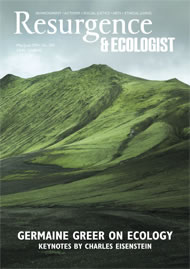Jeremy Leggett’s account of the consequences of our worldwide addiction to fossil fuels in the face of human-generated climate change is a fascinating tour de force. He minces no words in declaring that the choice in front of us is either to permit what he calls “the incumbency” to lead us lamely to economic and energy-resource catastrophe in which global warming plays the ultimate card, or to come to our senses and opt for an energy future which is affordable and drags us back from the brink of irreversible climate change.
The global economy has now become intrinsically connected to the cost of providing ever-increasing flows of energy at prices that do not threaten capital markets. Leggett, therefore, counts four systemic risks to the status quo of economic stability. They include: 1. Oil depletion and a widening gap between production and the discovery of sufficiently massive oilfields to replenish the deficit generated by increasing demand; 2. carbon emissions, now at 400ppm of carbon dioxide, and if allowed to rise further through the rampant burning of fossil fuels, leading to average surface temperature increases of 4°C or even 6°C within the century; 3. The widespread exploitation of carbon assets, including ‘tight’ oil from tar sands; 4. Shale gas, with potentially devastating environmental impacts on water quality, quite aside from fugitive emissions of methane gas.
So much has been said as to the great energy future which will potentially result from the extraction of shale gas, but that hyperbole has to be viewed in the cold light of reason. Leggett points to a massive industry-led cover-up as to the real quantities of shale gas that can be extracted from each well. It is a glaring case, he says, of the ‘Red Queen Syndrome’ whereby we have to run faster and faster simply to stay where we were and he refers to data which show that the US has to drill 25,000 wells a year just to maintain the production of the year 2000 when just one-fifth of the number of wells were in operation.
Finally, and by no means least, Leggett adds a fifth risk relating to the relationship between energy provision and the cost of doing so, especially when the incumbency of leaders in the energy field, (with a host of politicians in tow), keep singing the same discredited tune that we can burn fossil fuels with impunity because mankind has next to nothing to do with current climate change.
Jeremy Leggett, as a petroleum geologist and academic, not only brings his considerable knowledge of the oil and hydrocarbon industry to bear in his deliberations about peak oil and hydrocarbon use, but, as an entrepreneur and activist in the development and exploitation of renewable energies – and in particular photovoltaics – he has lived entrenched in the history of energy use during the past few decades. He therefore gives a blow-by-blow account of the machinations of the heads of the oil industry to obfuscate the reality of exploitable conventional petroleum being a finite resource and to conceal from investors and indeed governments, the looming fact of peak oil.
During the past decade, Leggett has been to innumerable meetings with leaders in the oil industry, with politicians and heads of government, be it Cameron or Blair, with non-governmental organisations striving to promote sustainable practices within a reasonably stable climate, and to meetings of the Intergovernmental Panel on Climate Change (IPCC). Very refreshingly, he has peppered his book with notes and insights from such meetings, giving a frank appraisal of the likelihood of political action to draw us away from the brink of economic and climate disaster.
Weather-beaten through such experiences, he is increasingly pessimistic that the UK government will act responsibly in terms of its energy strategy to avoid the economic and environmental implications of peak oil and global warming. Just recently, we heard Cameron giving out the news that he will encourage local councils to permit fracking through the sweetener that they will receive 100% of the business rate taxes from such exploitation.
Having made it abundantly clear that adherence to the incumbent position on energy will result in economic collapse, Leggett talks in his final chapter on how we can avoid the apocalypse. That renaissance will depend on local community-based initiatives to develop and apply a wide range of renewable and carbon-neutral energy resources, which, when combined with energy efficiency, will offer a host of advantages, not least of which will be the requirement of a skilled workforce.
All in all, The Energy of Nations is an enthralling book which should be a ‘must-read’ for all those who are determining through their decisions whether or not we will have a future worth living.








